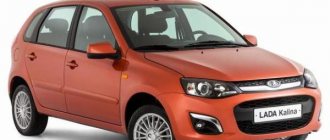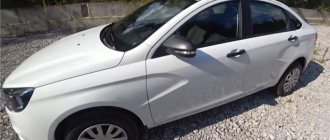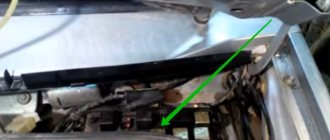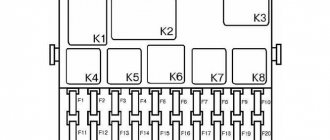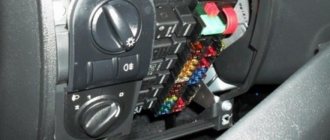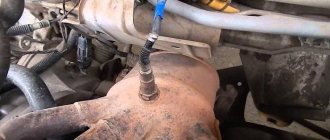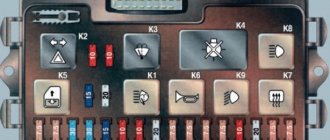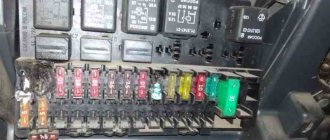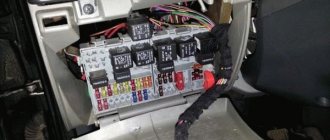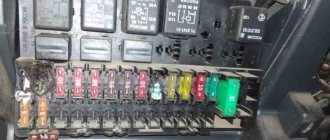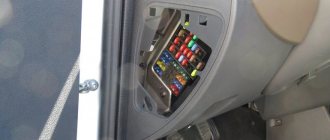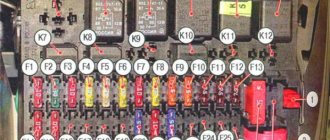Kalina » Maintenance and repair
A possible cause of non-working power windows, cigarette lighter or other electrical appliance may be a blown fuse or broken relay.
Below - about fuses and relays on the LADA Kalina (station wagon, hatchback) of the 2nd generation: where they are, how the circuits are deciphered and how to replace them yourself.
Differences in electronics of Lada Kalina 1 from Kalina 2
These two cars, despite their external similarities and common base, have different electrical wiring structures.
The second generation used Renault's developments, which explains the appearance of a body electronics unit, like on the Lada Vesta. In addition, these cars received completely different mounting blocks and their location.
The difference in the mounting blocks is also explained by the appearance on the Lada Kalina 2 of an automatic transmission, climate control and heated windshield. In addition, almost all trim levels now have DRLs. Therefore, diagnosing faults related to blown fuses on these machines is carried out differently.
Block in the engine compartment
The engine compartment fuse box on LADA Kalina 2 is fixed near the positive terminal of the battery.
Location
Location diagrams and decoding are given in the tables below.
For cars assembled in 2013-2016
| No. on the diagram | Denomination, A | Protected Circuits |
| 1 | 50 | Heated windshield |
| 2 | 60 | Generator |
| 3 | 60 | Generator |
| 4 | 30 | Cooling system fan (versions without climate control or air conditioning) |
| 4 | 40 | Cooling fan |
| 5 | 50 | Electromechanical power steering |
| 6 | 40 | ABS |
For cars assembled in 2022, 2022
| No. on the diagram | Denomination, A | Protected Circuits |
| 1 | 60 | Generator |
| 2 | 60 | Generator |
| 3 | 30 | Cooling fan (in configurations without climate control or air conditioning) |
| 3 | 40 | Cooling fan |
| 4 | 40 | ABS/ESC |
| 5 | 25 | ABS/ESC |
| 6 | 50 | Electric power steering |
Where are the fuses and relays located?
Depending on the generation of the car, the fuse blocks have differences, and, consequently, different installation locations.
Location of fuse and relay blocks on Lada Kalina 1
The first generation Kalinas were equipped with several fuse blocks at once. Their location has several places and they are all in the cabin:
- The main unit is located under the panel, to the left of the steering column.
- Another block was mounted under the cigarette lighter, next to the gearshift lever.
- Another mounting block is located under the dashboard, inside the central tunnel.
Where are the mounting blocks located in Lada Kalina 2
The second generation Lada Kalina has two fuse blocks. The main one is located inside the cabin, and in some trim levels it is also installed under the hood.
- One is located in the cabin, to the left of the steering column, under the cover.
- The additional fuse box is located in the engine compartment, to the right of the battery.
It is worth considering the location of the mounting block to avoid mistakes in diagnosing the car.
Replacement process
In order to change the cigarette lighter fuse of the Lada Kalina model, you need to get to the mounting block. It should be located behind the decorative panel, on the left side of the front console.
- We snap off the plastic clips.
- We take the tweezers located in the mounting block.
- We take out fuse No. 20 (first generation). Another protective element has No. 18 (second generation).
- Install a new fuse.
It is important that the value of the new part coincides with those recommended by the manufacturer (15 amps - first generation, 20 amps - second). Otherwise, there is a high probability of increased load on the circuit and tripping of the fuse. This may cause the wiring to melt, short circuit and fire.
Correct selection and replacement of fuses on Kalina
The fuse in a car is a plastic product with two contacts, inside of which there is a fuse link.
Different fuses are designed for different current values and if this parameter is exceeded, the insert burns out. It is very important to install the same one in place of the required fuse and not make a mistake.
For example, if a 15 Ampere fuse is installed on the cigarette lighter, then it is no longer possible to install a 60 Ampere or 5 Ampere insert.
The fact is that with a high operating current, the device can burn out or melt the wiring in the event of a malfunction. And with a high current of 15 Amps, a 5 Ampere fuse may blow immediately after turning on the device, since it is not designed for such work.
Fuse links differ in color and amperage. Currently, the following colors and fuses are used in cars:
| Color | Clearly | Operating current |
| Brown-yellow | 5A | |
| Brown | 7.5A | |
| Red | 10A | |
| Blue | 15A | |
| Yellow | 20A | |
| White | 25A | |
| Green | 30A | |
| Orange | 40A | |
| Red | 50A | |
| Blue | 60A |
Lada Kalina cars of the 1st and 2nd generations use blade fuses of the Norma and Maxi standards. The latter are used on Kalina 2 in the engine compartment and several of them are used on Lada Kalina 1 in the cabin.
To replace fuses, there is a special puller in the main unit, which is located in the lower right corner.
What to do if replacing the fuse does not help
There are additional faults due to which the device on Kalina may break. These include.
- Bad contacts. Over time or from heavy use, the connection inside the device may become compromised. Incorrect installation of devices leads to loose sockets and poor contact. The fuse trips. This can be treated by bending the metal tendrils on the cartridge, as well as by resoldering the contacts.
- With age, oxides or rust appear on Kalina's cigarette lighter, which has a bad effect on its operation. The situation can be corrected by treating the contact areas with a needle file. It is necessary to clean them and remove all traces of corrosion. Another malfunction is a burnt-out nichrome spiral. It is recommended to replace the device here.
The price of a new cigarette lighter for Kalina is 300 – 750 rubles. When choosing, you need to buy original parts. They must be carefully packaged, and quality certificates and certificates of conformity must be located inside. When buying cheap Chinese analogues, be prepared for the fact that the fuses may burn out, and the device itself may not work for long and incorrectly.
How to select and replace a relay on Kalina
A relay in a car is used to remotely control consumers that require high currents.
For example, to activate the starter, the ignition switch contacts and its wiring will not be enough. Therefore, the lock serves only as a control device, and the relay closes the power contacts and the retractor relay circuit.
In cars of both generations, the most common 4 and 5-pin relays are used. However, two types of sizes are used here; this should be taken into account when selecting. It is better to look at the characteristics of the relay on the body and buy exactly the same one or show the required relay to an auto parts dealer. Automotive relays can vary in current strength, number and location of contacts.
To replace faulty relays and fuses on the Lada Kalina, use a special “pliers” tool, which is installed in the lower right corner. The larger ones are for relays, and the smaller ones are for fuses.
If, after replacing the fuse, it has blown again, you should not try to change it again; most likely there is a short circuit in the circuit and the car must be sent for more thorough diagnostics.
Video instruction
Sometimes a complete replacement of the device is required. To do this, you need spare parts and a standard screwdriver. The order of work is as follows.
- Open the hood, find the battery and remove the negative terminal from it.
- We unscrew the three mounting bolts around the parking brake handle, which is located on top of the central tunnel. We dismantle the hand brake limit switch.
- We unscrew the rear fastening screw, as well as additional screws on the sides.
- Remove the cover from the gear lever, and then lift the tunnel cover.
- We disconnect the power plug coming to the electrical wiring circuit.
- We press the special latches that hold the device itself. Once it pops out, you can replace it.
- Next, we install the new part on the Lada Kalina and carry out the reassembly process.
The video below will help you understand where it is located and how to replace the cigarette lighter fuse of the Lada Kalina model.
PROMOTION: SALE OF NEW CAR 2022 PRODUCTION
Fuse and relay diagram in Kalina 1
As mentioned earlier, in the first generation Lada Kalina there are three fuse and relay blocks. Therefore, each should be considered separately.
Main unit
To understand which fuses are installed in the main unit and what they are responsible for, you should read the table:
| Number | Operation current, A | What is he responsible for? |
| F1 | 10 | Hazard alarm, direction indicators, anti-theft system (immobilizer), instrument panel |
| F2 | 30 | Power windows |
| F3 | 10 | Alarm |
| F4 | 20 | Washer and wiper |
| F5 | 25 | Electric power steering ECU and heater motor |
| F6 | 20 | Horn |
| F7 | 10 | Interior lamps, instrument panel |
| F8 | 20 | Rear window defroster heating element |
| F9 | 5 | Dimensions - right side of the vehicle |
| F10 | 5 | Dimensions – left side of the vehicle |
| F11 | 7,5 | Immobilizer control unit |
| F12 | 7,5 | Low beam - right headlight |
| F13 | 7,5 | Low beam - left headlight |
| F14 | 10 | High beam - right headlight |
| F15 | 10 | High beam - left block headlight |
| F16 | 10 | PTF - right side |
| F17 | 10 | PTF – left side |
| F18 | 15 | Seat heating |
| F19 | 10 | Anti-lock braking system ECU |
| F20 | 15 | Cigarette lighter |
| F21 | 10 | Reverse switch |
| F22 | 15 | Standard alarm control unit |
| F23 | 25 | EUR |
| F24 | 7,5 | Email Air Conditioner Magnetic Clutch |
| F25 | 30 | Power supply |
| F26 | 25 | Anti-lock braking system ECU |
| F27 | 50 | EUR |
| F28 | 40 | ABS |
The last four fuses are backup and are necessary to replace blown ones.
To find out which relay is responsible for what in Lada Kalina 1, just study the following table:
| Number | Designation |
| K1 | Headlight wiper |
| K2 | Power windows |
| K3 | Starter |
| K4 | Additional relay |
| K5 | Relay-breaker for direction indicators and hazard warning lights |
| K6 | Windshield wiper and washer |
| K7 | High beam |
| K8 | Horn |
| K9 | PTF |
| K10 | Heated rear window |
| K11 | Seat heating element |
| K12 | A/C compressor clutch |
Fuse box under the cigarette lighter
There are only three inserts installed here. The purpose of the fuses is to protect the circuits of the engine injection system.
| Number | Current | Designation |
| F1 | 15A | Main relay switching circuit |
| F2 | 15A | Gasoline pump |
| F3 | 15A | Constant “+” power supply to the ECU |
Fuse and relay box under console
Closes the power parts of the engine injection system. On the second generation of the car, almost all relays and fuses from here will go to the main mounting block.
| 1 | Low fan speed |
| 2 | Main relay |
| 3 | High fan speed |
| 4 | Fuel pump relay |
| 5 | Electric fan fuse |
| 6 | — |
Table of fuses and relays in Lada Kalina 2
Lada Kalina 2 is significantly different from its predecessor and has a slightly different block with a different arrangement of fuses.
Main unit in the cabin
To understand what the relays and fuses on Kalina 2 are responsible for, study the table:
| Number | Operation current, A | Protected circuit |
| F1 | 15 | Power supply to engine ECU, ignition coils, fuel injectors and electric fan |
| F2 | 25 | UCH |
| F3 | 15 | ECU and automatic transmission drive |
| F4 | 15 | SRS ECU |
| F5 | 7,5 | Engine ECU, instrument cluster, UCH, power steering, brake light, speed sensor, automatic transmission mode selector, heated window switch and relay and heated seats |
| F6 | 7,5 | Reverse signal, automatic transmission controller, standard parking sensors and turn indicators |
| F7 | 7,5 | Canister valve, power supply for camshaft sensor, oxygen sensor, mass air flow sensor and manifold absolute pressure sensor |
| F8 | 25 | Heated mirrors and rear window |
| F9 | 5 | Side lights on starboard side |
| F10 | 5 | Side lights on the left side, instrument panel and key lights, license plate lights, glove box lights |
| F11 | 5 | Rear PTF |
| F12 | 10 | Low beam and headlight range control (right headlight) |
| F13 | 10 | Low beam and headlight range control (left headlight unit) |
| F14 | 10 | High beam - right side |
| F15 | 10 | High beam - left side |
| F16 | 10 | PTF front right |
| F17 | 10 | PTF front left |
| F18 | 15, 20 or 10 | Cigarette lighter and heated front seats |
| F19 | 20, 7.5 or 5 | Central locking control unit and ABS unit power supply |
| F20 | 15 | Horn |
| F21 | 10 | Gasoline pump |
| F22 | 15 | Front windows, windshield washers and rear wipers |
| F23 | 5 | Power supply for instrument panel and diagnostic connector |
| F24 | 7,5 | Compressor clutch and climate control unit power supply |
| F25 | 7,5 | Interior lamp, brake light |
| F26 | 25 or 10 | Anti-lock braking system or UCH valves |
| F27 | 25 or 30 | ABS valves or heater motor |
| F28 | 30 | Heater motor or climate control power supply |
| F29 | Reserve | Reserve |
| F30 | Reserve | Reserve |
| F31 | 30 | Momentary activation of high beams, front door power windows or ABS valves |
| F32 | 30 | Heater and climate control |
Relay designations in Kalina 2
| Relay number | Designation |
| K1 | Electric cooling fan |
| K2 | Window lifters |
| K3 | Starter control |
| K4 | Ignition Load Relay |
| K5 | Hazard warning and direction indicators |
| K6 | Windshield wipers or heated front seats |
| K7 | High beam |
| K8 | Sound signal |
| K9 | Low beam |
| K10 | Heated mirrors and rear window |
| K11 | Engine ECU ON Relay |
| K12 | Gasoline pump |
| K13 | Hazard or reverse lights |
| K14 | Additional relay for emergency lights or cooling fan |
| K15 | Heated windshield (two sections) |
| K16 | Heated windshield (two sections) |
| K17 | Air conditioning compressor |
Fuses under the hood of Kalina 2
Check out the engine compartment fuse table:
| F1 | Heated glass or generator |
| F2 | Generator |
| F3 | Generator or cooling fans |
| F4 | Cooling fan or ESP controller |
| F5 | Power steering or ESP unit power supply |
| F6 | Power supply for EUR or ABS pump |
Depending on the year of manufacture, different vehicle configurations may have different fuse designations.
Why do fuses blow and what are the symptoms?
Fuses never blow without a reason, and the Lada Kalina is no exception. Fuse links protect circuits from the following faults:
- Short circuit.
- Overload.
The task of the fuse is to save the electrical circuit: wiring, consumers and to prevent a fire caused by melting of wires or other parts of the electrical circuit.
A short circuit is one of the reasons for the melting of the insert, which most often occurs due to damage to the wires, a short circuit of the “plus” to body ground, or during an accident, as a result of which the harness or a separate wire was cut by a part of the body.
Overloads can be caused by the simultaneous operation of many consumers or when using low-quality compressors to inflate tires, powered from the cigarette lighter.
There is another reason, which occurs extremely rarely - the use of Chinese fuse-links, the operating current of which is slightly lower than that provided by the electrical circuit. Despite the fact that 15A may be indicated on the insert body, in fact, this figure may be lowered to 10.
The symptom of a blown fuse is complete failure of the consumer. For example, if the cigarette lighter does not work, then in 90% of cases, a blown fuse is to blame. To make sure of this, just open the lid, take out the fuse-link, guided by the table, and check its integrity. If this cannot be done visually, you can use a multimeter in dial mode.
A serviceable fuse should ring, but a blown fuse will show an open circuit on the device. If replacing the insert does not help, you will have to diagnose the fuse box or look for the problem elsewhere.
It is prohibited to use wire to repair the fuse! This may cause the wiring in the vehicle to catch fire.
Do-it-yourself repair of direction indicators and hazard alarms
If the turns disappear, as well as the car’s emergency signal, then you can try to solve this problem yourself:
- If the safety element and relay break down, the failed parts must be replaced. If the reason lies in a short circuit, then before replacing it is necessary to check all electrical circuits in which it could occur. Only after the cause of the short circuit and power surges has been eliminated, the devices need to be changed.
- If the hazard warning button is faulty, you just need to replace it. We have already talked about how to diagnose this part.
- As for electrical circuit diagnostics, it is carried out using a tester. If damaged sections of the wire are identified, they must be replaced. When laying them, make sure that the wiring does not come into contact with moving body elements. It is also recommended to additionally insulate new wires to increase the reliability of the insulation.
- If the reason is the light bulbs, then all burnt out light sources must be replaced. In the front and rear headlights, the lamps are changed by removing the protection from the headlights, disconnecting the power circuit from the lamp, as well as unscrewing the light source from the seat and replacing it with a new one. If the lamps in the side headlights do not work, then, as a rule, to dismantle the lighting sources, the lamp itself must be pryed off with a screwdriver, then disconnect the power cord and remove the device.
- If the reason lies in the steering column switch, then this device needs to be disassembled and checked. As a rule, the cause of switch failure is poor contact or abrasion. In this case, the failed switch is replaced with a new one. As for the contacts (no matter where - on connections or buttons), it is advisable to clean them.
- You should also check all the plugs and connectors, because it is quite possible that the problem is poor contact on them. Acidified contacts must be cleaned with a wire brush or sandpaper. If the contacts are burnt out, they will need to be replaced.
